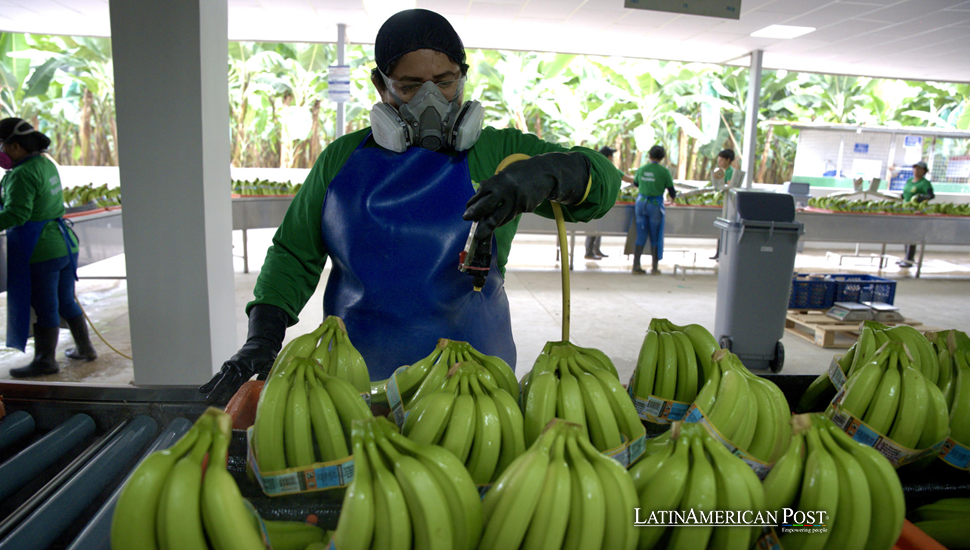Ecuador’s New Battle Against Fusarium R4T: A Global Push for Bananas

Ecuador, the world’s top banana producer, is taking center stage in a fight against Fusarium R4T, a devastating fungus that threatens banana crops. A new pilot program seeks to prevent the fungus from entering Ecuador, safeguarding its 3,000 small-scale producers.
Ecuador’s Vital Role in the Battle
Fusarium R4T is a fungal threat with no known cure, posing a severe risk to banana crops worldwide. With its origins in Asia, R4T has spread westward and reached Latin America, affecting banana plantations in Colombia, Peru, and Venezuela. As Ecuador shares borders with affected countries and leads global banana production, it has become a priority zone for prevention efforts. Gabriel Rodríguez, executive secretary of the Global Alliance Against Fusarium R4T and representative of the Inter-American Institute for Cooperation on Agriculture (IICA), emphasized the importance of keeping Ecuador’s banana industry safe. At the ‘Banana Time’ convention in Guayaquil, Ecuador’s largest international banana industry event, Rodríguez highlighted how the country’s success with this initiative could offer a model for other Latin American nations to follow.
The Alliance’s prevention program addresses the economic reliance of Ecuador’s 3,000 small banana producers, whose livelihoods are directly tied to the industry. “Individual efforts aren’t enough to combat this issue,” Rodríguez stated, stressing the need for collective action. The program will access World Bank funds to establish robust biosecurity protocols by working with Ecuador’s Banana and Plantain Cluster. If successful, the initiative could expand across the region to protect Latin American banana plantations.
A Three-Pronged Approach to Prevention
The pilot program has three main components: biosecurity, extension services, and training. It is explicitly designed to address small-scale farms, which may be most vulnerable to a Fusarium R4T outbreak. The IICA emphasizes that prevention is Ecuador’s best option, as Fusarium R4T devastates banana plants from the root up, leaving soil infected for decades. This fungus has a particularly devastating impact on the Cavendish banana variety, accounting for most bananas exported globally.
Training is crucial to this strategy, equipping farmers with biosecurity protocols tailored to their farms. These efforts focus on creating a fortified front by addressing entry points and spreading prevention measures. Additionally, specialized funding from the European Union is being sought to develop biotechnology solutions, as emphasized by Rodríguez at the convention. Partnering with the Spanish agricultural company Beyond Seeds, the IICA hopes to secure approximately 12 million euros to advance research in genetically resistant banana varieties and innovative biosecurity tools.
A European Concern for Food Security
Europe’s interest in Ecuador’s anti-fusarium program underscores the interdependence between Ecuadorian banana production and European food security. The European Union, among the world’s largest banana consumers, could face significant impacts if Ecuador’s banana industry were compromised by Fusarium R4T. José Antonio de Cote, manager for the Americas at Beyond Seeds, pointed out that the fungal threat to Ecuador’s bananas has broader global implications, including migration pressures on small-scale farmers whose crops could be wiped out by the fungus.
De Cote noted that alternative solutions, including developing new banana varieties that might resist R4T, are being explored. However, he cautioned that these new varieties might not replicate the taste and texture of the Cavendish banana, potentially creating commercial challenges in European markets. Finding an approach that balances crop resistance with consumer expectations remains a core goal, underscoring why developing effective biosecurity measures is as essential as technological solutions.
The Urgency of Preventing Fusarium’s Spread
With Fusarium R4T already detected in neighboring countries, Ecuador’s banana producers are acutely aware of the potential devastation. The fungus, which can remain in the soil for decades without cure, has become a critical threat to Ecuador and Latin America. Bananas are a staple food in many regions, and the spread of Fusarium R4T would not only disrupt local economies but also affect vulnerable communities’ access to affordable food.
Also read: Honduras’ Shrimp Businesses Faces Unprecedented Crisis
This pilot program in Ecuador stands as a blueprint for other banana-producing nations facing similar risks. Securing funding from global institutions like the World Bank and the European Union strengthens Ecuador’s immediate biosecurity measures and opens doors to long-term research and agricultural advancements. By working together, organizations like the IICA, Beyond Seeds, and national banana clusters aim to protect one of the world’s most significant food sources and support the communities that rely on it. As Ecuador prepares for this monumental challenge, global eyes are on its success, which could chart a path for combating Fusarium R4T worldwide.





